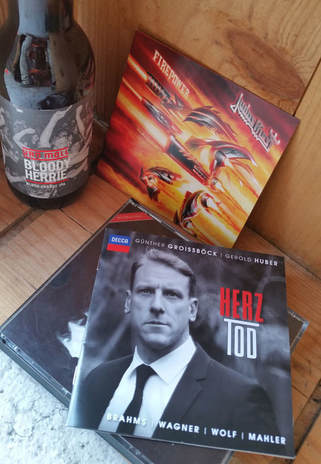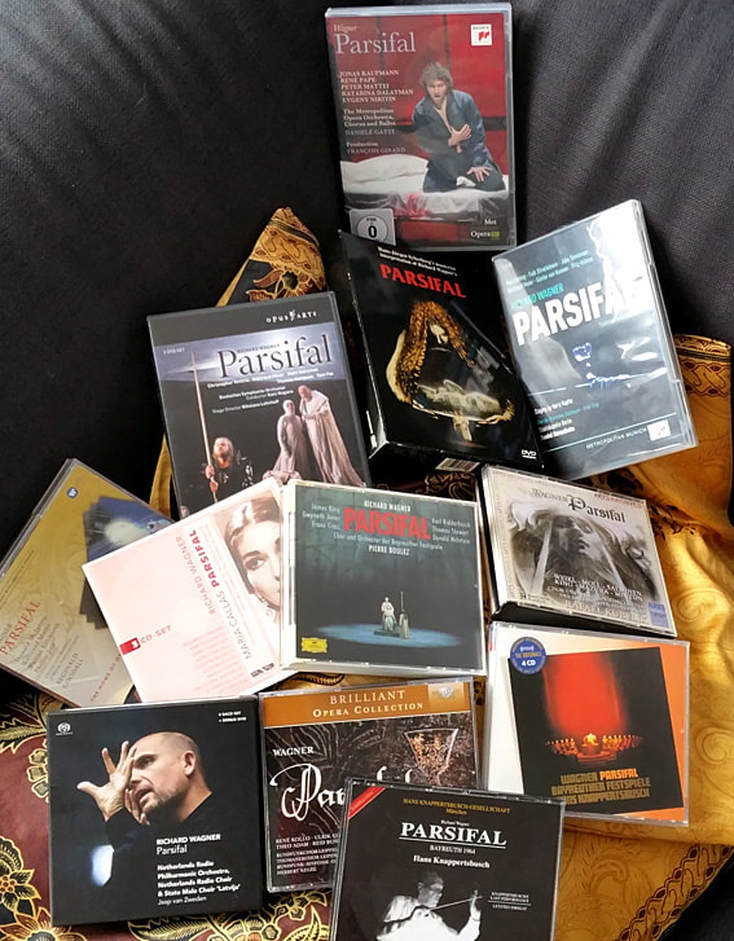JO-HO-TO-HOO! Before being exposed to the music of Richard Wagner, the godly possibilities of dark mooded music to nourish the inner self were already known to him, so it lied in the scheme of things that Wagner's music sounded as a natural extension to his musical world that was inhabited with Heavy Metal bands and melancholic songwriters. He was a man who, while attending a performance of Die Walküre, now about 17 years ago, found something he knew he had lost, and at that very moment, in the Muziektheater in Amsterdam, amidst Johotoho-chanting Walküre-sisters, realized that there might be a place where he could find it back. The opera house as a place of a musical landscape worth discovering. His connection with pop music was already subject to erosion when the death of Jeff Buckley finally severed it. With the demise of the American troubadour the last artist in the field of populair music that he could identify with was gone (with Chris Cornell as a possible exception). There was not much left that could enchant him any longer, the world of couplets & choruses had become a boring and predictable one. He had gone gone full circle with pop music, a finding that came with age. It was time to move on and only Wotan knew where to go next. That man, who found in Richard Wagner a doorway to new worlds of music, is heading for Bayreuth again. The place where Wagner built his Festspielhaus. A fitful point of arrival in a summer that started, music travel-wise, in Wagner's birthplace Leipzig (with BachFest). THE CHURCH OF WAGNER Attending an opera at the Festspielhaus is a visit to the past. Literally, the theatre dates from 1876, is without air conditioning, and one sits on wooden chairs, like believers in a church for seculars who may consider themselves chosen ones for the duration of an opera. Listening to and watching a Wagner opera in this theater can ask something from the attendee that he or she, pampered by the amenities of modern theaters, not always realize; that the lenght of those operas can not only be heard but also be felt. That listening to the third act of Die Meistersinger for instance not only can bring enlightenment (I think especially of the quintet here, one of the most beautiful pieces in all of opera) but can also translate into a sore back, stiff upper legs and an unquenchable thirst. Physical inconvenience that provides the comments of Wagner's contemporaries (and near-contemporaries) with some necessary context. Debussy, for example, thought that the operas from the Sorcerer of Bayreuth contained beautiful pieces of music - if only you didn't have to wait for them so damn long. THE ROAD TO PARSIFAL After attending a complete Ring-cycle in Bayreuth last year, this year's programme sees with Parsifal another deeply rooted wish fulfilled. Parsifal is the only opera Wagner wrote with the acoustics of the Festspielhaus in mind but it was for me, after having fallen for Wagner's music, also the least accessible one in the whole catalogue. Mark Twain's findings come to mind when I am thinking of my first acquaintance with it, listening to the famous Parsifal-recording of Knappertsbusch from 1951 - the year in which the Bayreuther Festspiele were held for the first time after the Second World War. It can be a pleasure to stare into the Wagner pendulum for a long time. To find in it a mean of elevating the spirit and cleansing the mind, but even for a self-proclaimed Wagner devotee an opera by the man, according to some the greatest genius in Western cultural history, can be a tough trip. After attending a performance of Parsifal in Bayreuth in 1891, Mark Twain had to acknowledge, to his regret, that in Wagner's last opera he could neither recognize melody nor rhythm. After reading in a German music magazine about Wagner's efforts to rid his operas of superfluous “runs, trills and schnörkel”, Twain concluded that he did not know what "schnörkel" was but that it must undoubtedly have been something he desperately missed. Tannhäuser had granted him with a love for opera but for Mark Twain Parsifal was a terrible drag. I had to go through a process of acceptance myself. The story, or lack thereof, seems to be dragging its way through seemingly static music. Even more so than in Wagner's other operas, the piece consists primarily of recapitulation, elaborating on the past, and it is devoid of any action - with Parsifal shooting a swan (hit) and Klingsor throwing a spear ( miss), you've kind of summarized all the action there is. I have reconciled myself with it by now, with the story of the grail. It has seriously touched me, this Bühnenweihfestspiel, a parade in angel pace on a magnificent tapestry of sound. Many versions and a few live performances later it has become the opera in the Wagner catalogue to which I most often return to. Rendez-vous at 25 August in the Bayreuther Festspielhaus. - Wouter de Moor
0 Comments
Leave a Reply. |
TIMELINE
July 2024
|



 RSS Feed
RSS Feed